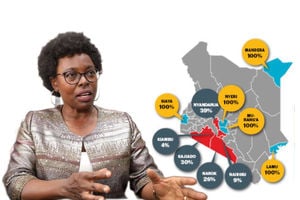
Council of Governors chairperson Anne Waiguru (centre) with her colleagues during a past media briefing in Nairobi.
All 47 counties are grappling with unpaid land rates and interest amounting to more than Sh100 billion as they struggle to meet revenue targets.
In some counties, the arrears date back to the defunct local governments.
To encourage payment, various counties have since 2013 turned to issuance of waivers, denying themselves billions of shillings in revenue.
Meanwhile, county governments have been left heavily relying on disbursements from the national government, which are sometimes hit by delays, paralysing key operations in the devolved units.
In some county governments such as Nairobi and Nakuru, national government institutions are the biggest defaulters, owing the devolved units millions in land rates.
According to the second edition of the Commission on Revenue Allocation and World Bank’s Comprehensive Own Source Revenue Potential and Tax Gap Study of County Governments report that was launched in October 2022, county governments have the potential to collect up to Sh216 billion annually compared to the current Sh37 billion.
Records obtained by the Nation indicate that Baringo County is owed Sh160 million in outstanding land rates.
The arrears, according to county lands and physical planning chief officer Nancy Chesire, date back to the defunct local governments, with Kabarnet municipality and Eldama Ravine township having the highest number of defaulters.
According to Ms Chesire, Sh113 million was inherited by the devolved unit from the former county council. “... since the advent of devolution, we have had an accumulation of Sh50 million,” she said.
Last month, the county gave landowners a two-month ultimatum to clear the debt.
In Kilifi, Governor Gideon Mung’aro recently said that the county will use its lawyers to make sure all the debts are paid to the county government as he announced a waiver on accrued interest.
“All the debts together with interest are estimated to be Sh30 billion because people have not paid for many years,” he said.
He added that if the landowners fail to pay, the county will seek court orders to auction the land to recover the tax.
Government and private entities and individuals in the capital owe Nairobi County an excess of Sh80 billion in land rates, according to records.
The rates are the top own-source revenue earner in Nairobi, accounting for about 25 per cent of revenue collected.
Mombasa County is owed more than Sh3 billion, while Kisumu and Kiambu are owed more than Sh10 billion each.
In Kirinyaga, about 6,000 plot owners owe the county over Sh200 million in arrears, Trans Nzoia is owed more than Sh3 billion, while Nakuru’s arrears stand at more Sh6 billion.
Last month, Kajiado Governor Joseph Lenku moved to recover unpaid land rates of Sh14 billion from Tata Chemicals Magadi Ltd.
The Nation yesterday established that counties are now pegging their hopes on a Bill before Parliament that seeks to give them powers to auction assets of businesses and individuals who default on land and property rates.
The National Rating Bill, 2022 proposes to empower the 47 county governments to seize and sell the property and land of defaulters upon the expiry of a 60-day notice to clear their dues.
Counties are currently not allowed under the law to seize and auction the property of defaulters.
“The county government may, for the purpose of recovering the rates due, auction the rateable property at the current market value in accordance with the provided procedures to recover the rates due,” reads part of the Bill.
The proposed law also seeks to rope in counties as beneficiaries in cases where the property is under succession.
The government-backed Bill is part of efforts by the National Treasury to increase counties’ own-source revenue.
The Bill, proposed by National Assembly Majority Leader Kimani Ichung'wah, further seeks to provide a legal framework for imposition of rates on land and buildings. It provides for the valuation of rateable property and the procedure for appointment and powers of valuers.









